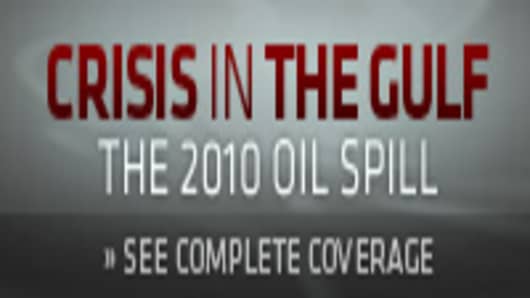The Obama administration on Tuesday proposed breaking up the agency responsible for both policing the oil industry and acting as its partner in drilling activities, seeking to end a decades-old relationship between industry and government that has proved highly profitable — and some say too cozy — for both.
The administration has been under pressure to address weaknesses in federal oil regulation since the BP well blowout in the Gulf of Mexico three weeks ago.
On Tuesday, Interior Secretary Ken Salazar said he planned to cut the agency that oversees the industry, the Minerals Management Service, in two. One office would be responsible for public safety and environmental enforcement and the other in charge of leasing and revenue collection. Details of the proposal are still being worked out.
“The job of ensuring energy companies are following the law and protecting the safety of their workers and the environment is a big one,” Mr. Salazar said, “and should be independent from other missions of the agency.”
Some in Congress and outside groups expressed skepticism that the organizational change alone would end what they called perverse incentives leading to rushed safety reviews and a regulatory system that in large measure allows the industry to police itself.
As lawmakers weighed the bureaucratic reshuffling, tens of thousands of gallons of crude oil continued to pour into the gulf, threatening hundreds of miles of coastline. BP executives said they were pursing multiple lines of attack but conceded that they still were days or weeks from even a partial solution.
Decades of law and custom have joined government and the oil industry in the pursuit of petroleum and profit. The Minerals Management Service brings in an average of $13 billion a year.
Under federal law, even in the case of a major accident, the company responsible for the oil well acts in concert with government in cleanup activities and can help put out information about the response effort.
Shortly after the gulf spill, government agencies and BP set up a joint information center and a Web site detailing remediation efforts. In this case, the communications effort, which includes the information center, based in a Shell-owned training and conference center in Robert, La., consists of roughly 65 employees, 10 of whom work for BP, Coast Guard officials said.
As the administration scrambled to respond to the unfolding environmental and economic disaster in the gulf, two Senate committees opened hearings into the cause of the April 20 accident. Executives of the three main companies involved in the spill — BP, Transocean and Halliburton — took turns pointing the finger at others for the failures of the systems designed to prevent a major blowout, even as they cautioned that the cause of the explosion was not yet known.
In their first testimony since the spill, top executives of BP, which owns the well; Transocean, which owned the drilling rig and did much of the work; and Halliburton, which provided various services, including cement work on the drill hole, all sought to shift blame.
“As a responsible party under the Oil Pollution Act, we will carry out our responsibilities,” said Lamar McKay, president and chairman of BP America. But he added that Transocean “had responsibility for the safety of the drilling operations.”
Steven L. Newman, president and chief executive of Transocean, said that the accident had to have arisen from elements of the work done by other companies.
“Were all appropriate tests run on the cement and the casing?” he asked, apparently implicating Halliburton.
Tim Probert, chief of health, safety and environment for Halliburton, said that all work on the casing by his company was carried out “as directed by the well owner,” meaning BP.
The ranking Republican minority member on the Senate Energy and Natural Resources Committee, Lisa Murkowski of Alaska, told them to stop the finger-pointing.
“I would suggest to all three of you that we are all in this together,” she said.
If this spill leads to a cutoff of offshore drilling, Ms. Murkowski said, “not only will BP not be out there, but the Transoceans won’t be out there to drill the rigs and the Halliburtons won’t be out there cementing.”
Several senators complained of what they said was the Minerals Management Service’s lax enforcement of safety and environmental standards, saying that regulators regularly rubber-stamped drilling plans that lacked detailed environmental assessments.
Senator Barbara Boxer, chairwoman of the Environment and Public Works Committee, said that the agency had granted BP an exemption from filing an environmental impact statement for the well that blew up, accepting company assurances that the chances of a major spill were remote. Such waivers are routinely granted when an impact statement has already been filed for a wider drilling area, but some environmentalists contend that a statement should be filed for each well.
“I am concerned that reports of corruption at M.M.S. — including illicit activities — might have played a role in these decisions and this approach,” Mrs. Boxer said. “Clearly, stronger, more independent oversight of oil company activities is needed.”
She was alluding to revelations two years ago that some minerals management officials in Colorado accepted gifts, trips, drugs and sexual favors from oil company representatives. The Interior Department’s inspector general found numerous abuses and characterized the agency as an ethical wasteland.
In announcing his plan to split up the minerals service, Mr. Salazar said it had become clear that the agency’s two missions were often in conflict. He said that he had undertaken a number of steps to improve ethics and tighten safety enforcement at the agency but that he decided more radical steps were needed.
Mr. Salazar also announced that he had asked the National Academy of Engineering to conduct an investigation of the causes of the Deepwater Horizon accident, a task that now falls solely on the minerals management agency and the United States Coast Guard.
And he said he was seeking a change in the law to provide more time for regulators to review safety and environmental plans for new wells. The law now requires government to act within 30 days on an application for a new well; Mr. Salazar would lengthen that to 90 days or longer if needed.
The proposal to divide the agency reflects a shift in attitude by the Obama White House since the spill began.
In March, a few weeks before the drilling rig explosion and fire that led to the spill, the president laid out plans for comprehensive energy legislation that called for new offshore drilling in the Atlantic Ocean from Delaware to central Florida. That legislation faced an uncertain path in the Senate even before the accident.
After the spill, Mr. Obama suspended his oil drilling plan, saying his administration would not approve any new offshore leases unless rigs had new safeguards.
Kieran Suckling, executive director of the Center for Biological Diversity, an environmental advocacy group, said Mr. Salazar’s changes were unlikely to significantly alter the culture and practices of government oil regulators.
“Salazar’s proposed reform doesn’t commit to separating M.M.S.’s revenue and environmental permitting arms,” Mr. Suckling said. “Thus it ignores the true scandal and allows the worst abuses to continue. M.M.S. will still have a conflict of interest, still waive environmental reviews and still rubber-stamp drilling plans.”
Some environmental groups have also objected to BP’s role in the joint information center and the Web site about remediation efforts. BP, said Erich Pica, president of Friends of the Earth, “is spinning the agencies and spinning the public.”
But Coast Guard officials said that the Coast Guard was the ultimate arbiter of what information was released, and that BP released announcements separately on topics not directly related to the response efforts.
“We tell them every single day that if there’s something that’s going to be impacting on them in that capacity, they need to put that on their Web site,” said Senior Chief Petty Officer Steve Carleton.
- Matthew L. Wald contributed reporting from Washington, Susan Saulny from Kenner, La., and Andrew W. Lehren from New York.
- Slideshow: The World's Worst Oil Disasters



